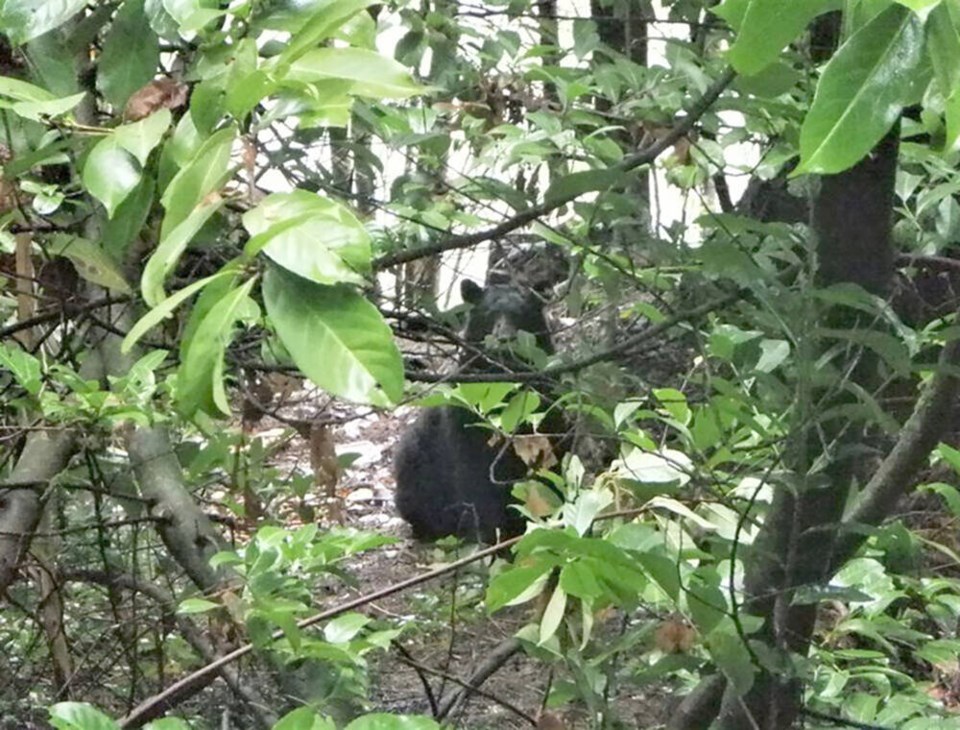A man convicted of deliberately feeding bears and coyotes near Capilano River failed to show up for a sentencing hearing in North Vancouver Provincial Court, Tuesday.
Kenneth Amaral, 59, was charged under the B.C. Wildlife Act with one count of intentionally feeding or attempting to feed dangerous wildlife and one count of placing an attractant that could attract dangerous wildlife, following an investigation by the BC Conservation Officer Service in 2022.
Amaral pleaded not guilty and faced a two-day trial on July 9 and 10.
The investigation began in April 2022 when a man living near the end of Keith Road in West Vancouver reported a stranger leaving piles of food around his property above Capilano River.
The neighbour confronted Amaral about the food piles and the bears and coyotes they were attracting. Amaral told the man he wouldn’t leave food there anymore, but motion sensor cameras placed by the BC Conservation Officer Service nabbed him leaving more “bait sites” on at least four other occasions over the following week, the court heard.
When a conservation officer met Amaral face to face at the site, the accused gave a voluntary statement in which he admitted that he had been leaving food.
In her closing arguments in court on July 10, Crown prosecutor Veda Kenda drew specific attention to the impacts that feeding wildlife has, with the trail cameras capturing images of coyotes and multiple bears at the bait sites within the first 24 hours.
While the investigation was ongoing, the conservation officer encountered one of the bears, she noted.
“And despite all of his training, he was unable to get that bear to go away from the bait site, and for his safety, he moved away,” she said. “[He] testified that, based on his experience and training, he noticed that intentional feeding of bears leads to habituation and food dependency, and can cause public safety concerns.”
The area near the bait sites is frequented by dog walkers, hikers and anglers, she added.
“Of course, the presence of the wildlife in that area would cause a major safety risk to that public,” she said.
In court, Amaral denied that his actions were meant to attract dangerous animals that weren't already living in the woods.
“I did not have any direct control or any kind of manipulation as far as being able to bring the animals to the food,” he said. “As I said in the past, it’s just a matter of I put it out – whatever came and ate it, ate it.”
He also characterized his behaviour in more benign terms – a desire to share food, that would otherwise go to waste, with animals.
“I have been feeding animals my entire life – family pets, strays and all types of wildlife included. It gives me a sense of calm and fulfills a nurturing side that I have,” he said.
North Vancouver Provincial Court Judge Robert Hamilton, however, said he could not “believe that explanation” and found Amaral guilty on both counts.
“The sheer volume of meat – raw chicken in one of the photographs and the sausage links and ground beef in another of the photos – that’s not leftover food for a single person.… That is a huge amount of food,” he said. “There are different ways of getting rid of food, but one way of getting rid of food that is illegal is to leave these large piles of food in a forest where the person knows bears, coyotes and other wildlife are present or are likely to be present.”
Given the number of instances in which he was caught on camera placing food, Crown prosecutor Veda Kenda said she would be seeking about $24,000 in fines for Amaral, although she added, she understood that it would be unlikely Amaral would have the means to pay.
Amaral was due back in court on Tuesday to begin his sentencing hearing, however, he did not show up. Hamilton said if the Crown could not get in touch with him to schedule a new sentencing hearing date by July 29, the court could issue a warrant for his arrest.
[email protected]
twitter.com/brentrichter
brentrichter.bsky.social
Want to stay updated on North Vancouver and West Vancouver news? Sign up for our free daily newsletter.



